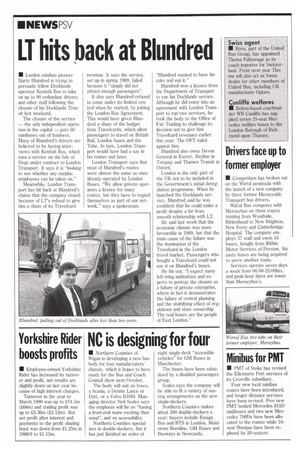IT hits back at Blundred
Page 20

If you've noticed an error in this article please click here to report it so we can fix it.
• London minibus pioneer Harry Blundred is trying to persuade fellow Docklands operator Kentish Bus to take on up to 90 redundant drivers and other staff following the closure of his Docklands Transit last weekend.
The closure of the service — the only independent operation in the capital — puts 60 minibuses out of business. Many of Blundred's drivers are believed to be having interviews with Kentish Bus, which runs a service on the Isle of Dogs under contract to London Transport. It says it is "looking to see whether any surplus employees can be taken on."
Meanwhile, London Transport has hit back at Blundred's claims that the company closed because of LT's refusal to give him a share of its Travelcard revenue. It says the service, set up in spring 1989, failed because it "simply did not attract enough passengers".
It also says Blundred refused to come under its limited control when he started, by joining the London Bus Agreement. This would have given Blundred a share of the budget from Travelcards, which allow passengers to travel on British Rail, London buses and the Tube. In turn, London Transport would have had a say in his routes and fares.
London Transport says that most of Blundred's routes were almost the same as ones already operated by London Buses. "We allow private operators a licence for many routes, but they have to regard themselves as part of our network," says a spokesman. "Blundred wanted to have his cake and eat it."
Blundred won a licence from the Department of Transport to run his Docklands service. Although he did enter into an agreement with London Transport to run two services, he took the body to the Office of Fair Trading to challenge its decision not to give him Travelcard revenues earlier this year. The OFT ruled against him.
Blundred also owns Devon General in Exeter, Bayline in Torquay and Thames Transit in Oxford.
London is the only part of the UK not to be included in the Government's initial deregulation programme. When he launched the Docklands service, Blundred said he was confident that he could make a profit despite a far from smooth relationship with LT.
He said last week that the economic climate was more favourable in 1989, but that the main cause of the failure was the domination of the Travelcard in the London travel market. Passengers who bought a Travelcard could not use it on Blundred's buses.
He hit out: "I expect many left-wing authorities and experts to portray the closure as a failure of private enterprise, where in fact it demonstrates the failure of central planning and the stultifying effect of regulations and state ownership. The real losers are the people of East London."
















































































